
North-Western Journal of Zoology
metrics 2024
Exploring the Depths of Zoological Research
Introduction
North-Western Journal of Zoology is a prominent scholarly publication dedicated to the field of zoology, fostering a vibrant exchange of research findings and insights among scientists, professionals, and students. Published by UNIV ORADEA PUBL HOUSE in Romania, this journal has been a reliable source for advancing knowledge in Animal Science and Zoology since its inception in 2008, with its publications spanning until 2024. With an engaging focus on innovative research and review articles, the journal proudly holds a Q3 quartile ranking in its category for 2023, positioning itself within the competitive landscape of Scopus Ranks. Although currently lacking an open-access model, the journal provides a valuable platform for disseminating critical findings essential to understanding animal biology and ecology. Researchers contributing to this journal benefit from a dedicated readership, furthering the discussion and practical applications of their work in diverse contexts.
Metrics 2024
 0.26
0.26 0.70
0.70 0.80
0.80 24
24Metrics History
Rank 2024
Scopus
IF (Web Of Science)
JCI (Web Of Science)
Quartile History
Similar Journals
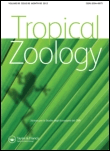
TROPICAL ZOOLOGY
Exploring the vibrant ecosystems of the tropics.TROPICAL ZOOLOGY is a prestigious academic journal dedicated to advancing knowledge and research in the fields of animal science, zoology, and ecology. Published by PAGEPRESS PUBL, this journal has been an integral part of the scientific community since its inception in 1988, providing a platform for the dissemination of innovative research and discoveries related to tropical wildlife and ecosystems. With an impact factor placing it in the Q3 category for both Animal Science and Zoology, as well as Ecology, Evolution, Behavior, and Systematics, it ranks among the noteworthy publications in these fields. Researchers, professionals, and students will find that TROPICAL ZOOLOGY is an essential resource for the latest findings, fostering a deeper understanding of biodiversity and conservation in tropical environments. The journal is based in the United Kingdom, with additional administrative support from MEDIGROUP in Italy, ensuring a broad international perspective and reach. While it does not operate under an open access model, it remains committed to high-quality peer-reviewed content that contributes significantly to the understanding of tropical ecosystems and the species that inhabit them.
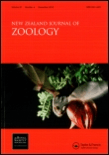
NEW ZEALAND JOURNAL OF ZOOLOGY
Advancing Knowledge in Zoology and Wildlife Studies.NEW ZEALAND JOURNAL OF ZOOLOGY, published by Taylor & Francis Ltd, offers a crucial platform for the dissemination of high-quality research in the field of zoology and animal science. With an ISSN of 0301-4223 and an E-ISSN of 1175-8821, this journal has been a valuable resource since its inception in 1974 and continues to contribute significantly to the academic community, with a converged years span extending to 2024. The journal holds a commendable Q3 ranking in the 2023 category of Animal Science and Zoology, and ranks #175 out of 490 in Scopus, placing it in the 64th percentile of its category. While it is not an Open Access journal, researchers can still access a wide range of studies that delve into various aspects of zoology. With its robust editorial standards and commitment to advancing knowledge in animal science, the NEW ZEALAND JOURNAL OF ZOOLOGY serves as an essential resource for researchers, professionals, and students interested in the complexities of wildlife and ecological studies.

ACTA ZOOLOGICA ACADEMIAE SCIENTIARUM HUNGARICAE
Championing Open Access to Animal Science DiscoveriesACTA ZOOLOGICA ACADEMIAE SCIENTIARUM HUNGARICAE, published by the Hungarian Natural History Museum, is a distinguished open access journal dedicated to advancing knowledge across the fields of Animal Science, Zoology, Ecology, Evolution, Behavior, and Systematics. Established in 2003 as an open access platform, this scholarly journal has actively contributed to the dissemination of critical research since 1996, positioning itself within the Q3 quartile in both its primary fields as of 2023. With its ISSN 1217-8837, ACTA ZOOLOGICA serves as a vital resource for researchers, professionals, and students aiming to explore and expand their understanding of animal biodiversity and ecology. Its publication features a variety of empirical studies, reviews, and critical commentaries that rigorously address contemporary issues in zoological sciences, underlining its commitment to fostering academic excellence and environmental sustainability. Researchers can access the journal’s extensive archives to deepen their inquiry into animal life, making it an essential addition to any academic library.

MARINE ORNITHOLOGY
Navigating the Intersection of Animal Science and OceanographyMarine Ornithology, published by the Pacific Seabird Group, is a vital resource in the field of animal science, zoology, and oceanography. With an ISSN of 1018-3337 and E-ISSN of 2074-1235, this journal has been a cornerstone for researchers and enthusiasts since its inception, actively contributing to the understanding of marine bird species and their ecosystems. Although it is currently not an open-access journal, it provides critical insights and findings that inform both academic research and practical conservation efforts. With its category quartiles positioned in Q3 for both Animal Science and Zoology, and Oceanography, Marine Ornithology occupies a significant, albeit competitive niche among scholarly publications. Researchers can benefit from its comprehensive coverage of marine avian studies, which is crucial for addressing the challenges these species face in changing oceanic environments. As the journal continues to evolve, with coverage from 1990 to 2024, it maintains an essential role in enriching our knowledge of marine biodiversity.

ANIMAL BIOLOGY
Bridging Research and Ecological Awareness in Animal BiologyANIMAL BIOLOGY is a distinguished journal published by BRILL, focusing on the dynamic fields of Animal Science and Zoology, as well as Ecology, Evolution, Behavior, and Systematics. With an ISSN of 1570-7555 and an E-ISSN of 1570-7563, this quarterly journal serves as a pivotal platform for researchers and professionals seeking to contribute to the understanding of animal biology across diverse ecological contexts. The journal is recognized with a 2023 Scopus ranking of #234 out of 490 in the Animal Science and Zoology category, placing it within the 52nd percentile, alongside a rank of #409 out of 721 in Ecology, marking a solid contribution to the field. Although it currently holds a Q3 quartile in both categories, its commitment to quality research and novel insights continues to bolster its significance within the academic community. The open access option coupled with its publication history from 2003 to 2024 ensures a wide dissemination of knowledge, drawing in a global audience of researchers, professionals, and students eager to explore the intricacies of animal biology. By promoting high-quality discussions and innovative studies, ANIMAL BIOLOGY plays an essential role in advancing the understanding of life sciences and the evolution of biodiversity.

RAFFLES BULLETIN OF ZOOLOGY
Pioneering Research for Global Wildlife ManagementRaffles Bulletin of Zoology, published by the National University of Singapore's Lee Kong Chian Natural History Museum, serves as a prestigious platform for the dissemination of cutting-edge research in Animal Science and Zoology, as well as Ecology, Evolution, Behavior and Systematics. With a current impact factor reflective of its Q2 category in both fields, this journal not only enhances its visibility in the academic community but also provides valuable insights into the complexities of biodiversity and conservation efforts. Covering a wide array of topics, Raffles Bulletin facilitates interdisciplinary collaboration and serves as an essential resource for researchers, professionals, and students alike. It is indexed in Scopus, ranking #233 out of 490 in Animal Science and Zoology and #406 out of 721 in Ecology, ensuring that the research published contributes significantly to the global discourse on wildlife and ecosystem management. Since its inception in 1996, this journal has bridged gaps in knowledge and continues to foster a deeper understanding of the living world.
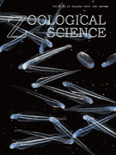
ZOOLOGICAL SCIENCE
Advancing the Frontiers of Animal ScienceZoological Science, published by the Zoological Society of Japan, is a leading journal dedicated to the fields of animal science and zoology. With its ISSN 0289-0003, this respected publication has established itself as a prominent source of scientific research, attaining a commendable Q2 ranking in the 2023 category of Animal Science and Zoology. Spanning over three decades, from 1992 to 2024, the journal offers a valuable platform for scholarly articles that explore various aspects of zoology, including ecology, behavior, and evolutionary biology. Although it operates under a traditional subscription model, its contributions are supported by a robust community of researchers and professionals who value its insights. The journal strives to foster academic discourse and insights that drive understanding and conservation of wildlife, making it an essential resource for students and established experts alike. The publishing headquarters located in Tokyo, Japan, further enhances its international reach and influence in zoological studies.
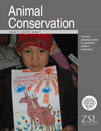
ANIMAL CONSERVATION
Preserving Nature's Legacy, One Study at a Time.Animal Conservation is a prestigious journal that serves as a vital platform for the dissemination of research dedicated to the preservation of wildlife and habitats. Published by Wiley, this journal has established a significant presence in the fields of Ecology and Nature and Landscape Conservation, holding a distinguished Q1 category ranking for both in 2023. With an impressive Scopus rank of #25 in the realm of environmental science, it caters to a global audience keen on understanding and addressing pressing conservation issues. The journal provides researchers, professionals, and students with high-quality, peer-reviewed articles that explore innovative methods and strategies in animal conservation. With its continuous publication since 1998, encompassing a comprehensive range of topics, Animal Conservation is indispensable for anyone aiming to make impactful contributions to the field of ecology and conservation biology.
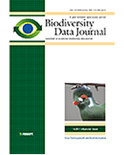
Biodiversity Data Journal
Exploring the richness of life through rigorous scientific inquiry.Biodiversity Data Journal, published by PENSOFT PUBLISHERS, is a leading open-access platform that has been facilitating the dissemination of scientific knowledge since its inception in 2013. With a focus on enriching the fields of Agricultural and Biological Sciences, Animal Science and Zoology, Ecology, and Plant Science, this journal plays a pivotal role in promoting research outputs related to biodiversity, encompassing ecological data, species inventories, and conservation strategies. It has achieved commendable rankings in various categories, notably securing a Q2 rating in several key areas, indicating its growing influence within the academic community. The journal’s contribution to advancing the understanding of biodiversity is further enhanced by its commitment to open access, ensuring that vital research findings are widely accessible to researchers, professionals, and students worldwide. By publishing comprehensive datasets and innovative research, the Biodiversity Data Journal remains an essential resource for those looking to stay at the forefront of biodiversity science and environmental stewardship.

BELGIAN JOURNAL OF ZOOLOGY
Innovating Research in Animal Biology and Ecology.The BELGIAN JOURNAL OF ZOOLOGY, published by the Royal Belgian Zoological Society, serves as a prominent platform for advancing research in the field of zoology. With an impact factor reflecting its status within the academic community, this journal rigorously publishes innovative studies and reviews, covering a broad spectrum of topics related to animal science and zoology. As an esteemed outlet, the journal ranks in the Q2 category for both Animal Science and Zoology, demonstrating its relevance and contribution to the field, as indicated by its Scopus ranking of 255 out of 490. Although it operates under a subscription model, the journal is committed to disseminating high-quality research that can shape contemporary understanding of animal biology and ecology. With a publication history dating back to 1990 and extending through 2024, researchers, professionals, and students are encouraged to engage with its rich content, which is vital for ongoing discourse and discovery within zoological sciences.